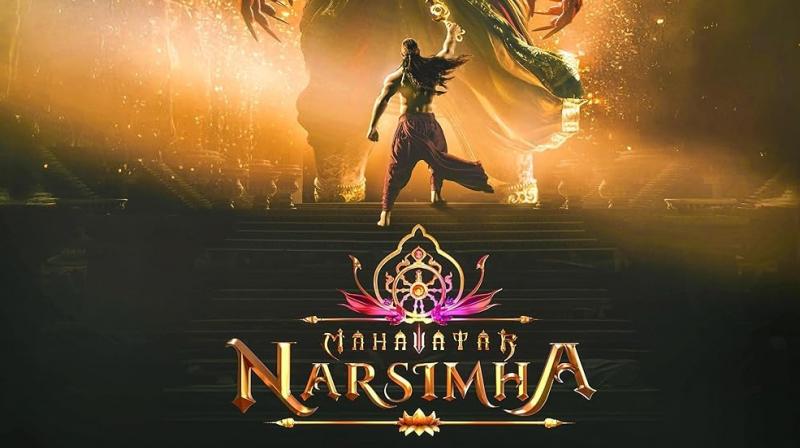Mahavatar Narsimha Review: A Visually Grand Mythological Epic That Falters Emotionally

Movie: Mahavatar Narsimha
Director: Ashwin Kumar
Music: Sam C. S.
Production: Hombale Films & Kleem Entertainment
Language: Kannada (dubbed in multiple Indian languages)
Genre: Mythological Animation, Devotional Action
Rating: (3.5/5)
-Pramod Mohan Hegde
India’s animated film industry takes a giant leap with Mahavatar Narsimha, a mythological saga that marks the beginning of the Mahavatar Cinematic Universe. Rooted in the sacred texts of the Bhagavata Purana, Vishnu Purana, and Agni Purana, the film brings to life the story of Lord Vishnu’s fierce Narasimha avatar in a stunning animated format. While the film excels in grandeur and thematic depth, it struggles with emotional consistency and pacing.
The story follows the age-old cosmic conflict between good and evil, devotion and ego. As the tyrant king Hiranyakashyap seeks to destroy all that is divine, his young son Prahlad remains a staunch devotee of Lord Vishnu. The film traces the tension between father and son, culminating in the dramatic appearance of the Narasimha avatar—a half-man, half-lion incarnation of Vishnu—who emerges to protect righteousness and destroy arrogance.
What Works: The animation showcases massive divine landscapes, apocalyptic battles, and majestic character designs. The depiction of Narasimha’s transformation and celestial realms is nothing short of cinematic spectacle. Composer Sam C. S. blends orchestral music with Vedic chants and tribal rhythms, elevating the emotional and spiritual essence of the narrative. The background score adds gravitas to key moments. The voice acting—especially for Prahlad, Hiranyakashyap, and Narasimha—adds emotional resonance, anchoring the mythological figures in humanity and vulnerability. At its core, the film is about faith in the face of tyranny. It reflects on the dangers of ego, the power of innocence, and divine justice, making it relevant beyond its mythological base.
What Doesn’t work: While key sequences are breathtaking, several scenes—especially facial animations and crowd sequences—lack polish and fluidity. Some characters appear overly stylized, detracting from their mythic aura. After an engaging start, the middle portion slows down with side plots that feel stretched. Some songs seem out of place and affect the narrative flow. Despite a strong premise, certain emotional arcs—especially in the climax—do not deliver the expected cathartic impact. Dialogue, at times, feels dated and overly theatrical.
Final Verdict
Mahavatar Narsimha is a commendable effort and a landmark in Indian animated cinema. It is visually rich, thematically bold, and spiritually rooted. Though it has its flaws in execution, the film succeeds in reintroducing mythology to a new generation in an accessible and cinematic way. Families, mythology enthusiasts, and animation fans will find something to admire here—especially if viewed on the big screen. A grand visual treat with divine ambition, but the emotional roar doesn’t always land as powerfully as the visual one.

